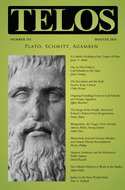Jakob Norberg’s “Day-to-Day Politics: Carl Schmitt on the Diary” appears in Telos 157 (Winter 2011). Read the full version online at the TELOS Online website, or purchase a print copy of the issue here.
 Early on in his career, Carl Schmitt articulated a cultural critique of the diary. He saw the personal journal as a manifestation and reinforcement of the writing subject’s vanity and self-importance in a sterile modern world. The resulting record, moreover, offered up the diarist’s inner life to the gaze of dissecting readers, who tended to convert polemical arguments into psychological symptoms. Yet Schmitt also kept something like a daily journal and was thus forced to struggle against the diary from within the genre itself. His post-1945 notebooks, entitled Glossarium, constitute a cultural battlefield upon which this struggle takes place. By means of strategies such as scathing portraits of famous diarists and displays of sententious concision, Schmitt sought to expel the diary from his own notebooks, or stage a paradoxical day-to-day resistance to the pathologies of the age emblematized in the diary form itself. The study of Schmitt’s non-diary ultimately sheds light on his political understanding of writing. For him, genres are never neutral vehicles of ideas but rather inflect thought in ideologically relevant ways.
Early on in his career, Carl Schmitt articulated a cultural critique of the diary. He saw the personal journal as a manifestation and reinforcement of the writing subject’s vanity and self-importance in a sterile modern world. The resulting record, moreover, offered up the diarist’s inner life to the gaze of dissecting readers, who tended to convert polemical arguments into psychological symptoms. Yet Schmitt also kept something like a daily journal and was thus forced to struggle against the diary from within the genre itself. His post-1945 notebooks, entitled Glossarium, constitute a cultural battlefield upon which this struggle takes place. By means of strategies such as scathing portraits of famous diarists and displays of sententious concision, Schmitt sought to expel the diary from his own notebooks, or stage a paradoxical day-to-day resistance to the pathologies of the age emblematized in the diary form itself. The study of Schmitt’s non-diary ultimately sheds light on his political understanding of writing. For him, genres are never neutral vehicles of ideas but rather inflect thought in ideologically relevant ways.


